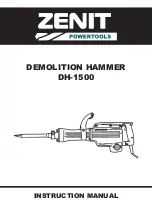
13 ENGLISH
Number
Revolutions per minute Blows per minute
5
310
2,250
4
280
2,050
3
220
1,650
2
160
1,150
1
150
1,100
CAUTION:
Do not turn the adjusting dial when
the tool is running. Failure to do so may result in
the loss of control of the tool and cause an injury.
NOTICE:
If the tool is operated continuously at
low speed for a long time, the motor will get over-
loaded, resulting in tool malfunction.
NOTICE:
The speed adjusting dial can be turned
only as far as 5 and back to 1. Do not force it past
5 or 1, or the speed adjusting function may no
longer work.
NOTE:
Soft no-load rotation function
When the speed adjusting dial is set to "3" or higher,
the tool automatically reduces the speed at no-load to
reduce the vibration under no-load.
Once operation starts with a bit against concrete,
blows per minute increase and reach the numbers as
shown in the table.
When temperature is low, the tool may not have this
function even with the motor rotating.
Lighting up the front lamp
►
Fig.5:
1.
Lamp
CAUTION:
Do not look in the light or see the
source of light directly.
Pull the switch trigger to light up the lamp. The lamp
keeps on lighting while the switch trigger is being pulled.
The lamp goes out approximately 10 seconds after
releasing the switch trigger.
NOTICE:
If the lamp goes off after blinking for a
few seconds, the active feedback sensing tech-
nology is not working properly. Ask your local
Makita Service Center for repair.
NOTE:
When the tool is overheated, the tool stops
automatically and the lamp starts flashing. In this
case, release the switch trigger. The lamp turns off in
one minute.
NOTE:
Use a dry cloth to wipe the dirt off the lens of
the lamp. Be careful not to scratch the lens of lamp, or
it may lower the illumination.
Selecting the action mode
NOTICE:
Do not rotate the action mode chang-
ing knob when the tool is running.
The tool will be
damaged.
NOTICE:
To avoid rapid wear on the mode
change mechanism, be sure that the action mode
changing knob is always positively located in one
of the three action mode positions.
Rotation with hammering
For drilling in concrete, masonry, etc., rotate the action
mode changing knob to the
symbol. Use a car
-
bide-tipped drill bit.
►
Fig.6:
1.
Action mode changing knob
2.
Pointer
Hammering only
For chipping, scaling or demolition operations, rotate
the action mode changing knob to the
symbol. Use a
bull point, cold chisel, scaling chisel, etc.
►
Fig.7:
1.
Pointer
2.
Action mode changing knob
Electronic function
The tool is equipped with the electronic functions for
easy operation.
Torque limiter
NOTICE:
As soon as the torque limiter actuates,
switch off the tool immediately.
This will help pre-
vent premature wear of the tool.
NOTICE:
Drill bits such as hole saw, which tend
to pinch or catch easily in the hole, are not appro-
priate for this tool.
This is because they will cause
the torque limiter to actuate too frequently.
The torque limiter will actuate when a certain torque
level is reached. The motor will disengage from the
output shaft. When this happens, the drill bit will stop
turning.
Constant speed control
The speed control function provides the constant rota-
tion speed regardless of load conditions.
Soft start
The soft-start function minimizes start-up shock, and
makes the machine start smoothly.
Active Feedback sensing Technology
If the tool body suddenly rotates at the specified accel
-
eration due to the drill bit locking, etc., the motor is
forcibly stopped to reduce the burden on the wrist.
NOTE:
The active feedback sensing technology func
-
tion does not work if the acceleration does not reach
the specified one.
NOTE:
The active feedback sensing technology
function also actuates just when the bit simply swung
at the specified acceleration in any operation.
In this case, release the switch trigger, and then pull
the switch trigger to restart the tool.
Electric brake
This tool is equipped with an electric brake. If the tool
consistently fails to quickly stop after the switch trigger
is released, have the tool serviced at a Makita service
center.
Summary of Contents for HR006G
Page 2: ...2 3 1 1 Fig 1 1 2 Fig 2 2 1 A B Fig 3 1 Fig 4 1 Fig 5 1 2 Fig 6 1 2 Fig 7 2 ...
Page 3: ...Fig 8 1 2 Fig 9 1 Fig 10 1 2 Fig 11 1 Fig 12 1 2 Fig 13 1 2 Fig 14 3 ...
Page 4: ...1 2 Fig 15 1 2 Fig 16 1 2 3 Fig 17 1 2 3 4 Fig 18 1 2 Fig 19 1 Fig 20 4 ...
Page 5: ...1 Fig 21 1 2 3 Fig 22 1 2 3 Fig 23 1 2 Fig 24 1 2 3 4 Fig 25 1 Fig 26 5 ...
Page 6: ...Fig 27 Fig 28 Fig 29 Fig 30 1 Fig 31 4 2 1 3 Fig 32 1 2 3 Fig 33 6 ...
Page 7: ...1 Fig 34 1 2 1 2 Fig 35 Fig 36 1 Fig 37 1 2 Fig 38 1 Fig 39 7 ...
Page 8: ...1 Fig 40 1 2 1 2 Fig 41 8 ...
Page 130: ...130 ...
Page 131: ...131 ...














































